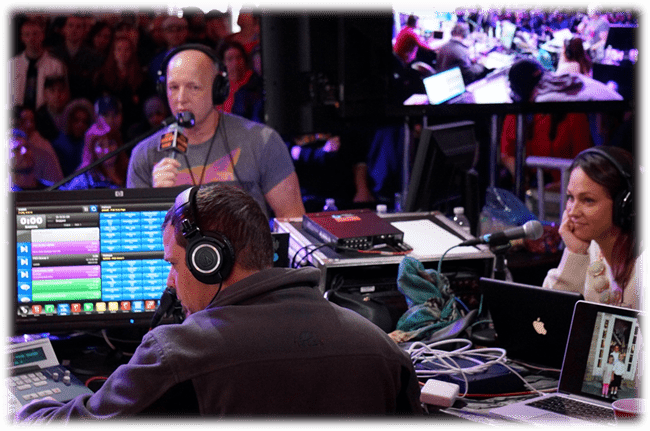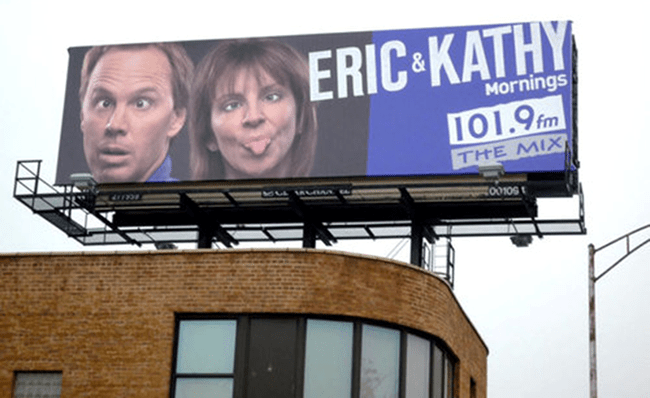In that ongoing debate about whether Pandora’s numbers are “real,” how their ratings are being calculated, and whether it is truly “radio” or not, something is being lost in translation.
Music services are simply just that – plentiful and easily duplicated. Over time, they’ll be a dime a dozen. Perhaps Pandora will remain the top dog because it was the first to truly understand ubiquity, combined with its human genome algorithm. But iTunes Radio, Spotify, the new Beats Radio, and the many other services of today and the ones that follow will simply become a whirlwind of sameness for many consumers.
And that brings us back to the radio, the original and most successful audio entertainment and information medium with the one attribute that is exclusive, impossible to duplicate, and the most valuable in local markets – talent.
Consumers are being inundated with choice, and at times, even overwhelmed by all this free content. But the one thing they almost always react to is the magnetism that is generated by personality. They are the difference-makers, the assets that set brands apart.
We see it even among some of the most jaded media buyers and account managers. They can say whatever they want to about how audiences are abandoning radio, but bring a bona fide DJ, host, or team to an agency, client gathering, or anywhere there are decision-makers, and the spotlight shifts to your talent. They rightfully become the center of attention, and change the conversation about whether a station is worthy of ad dollars. At that point, you’re looking at your ROI.
I am frequently asked why one music station performs better than another, and the conversation almost always gravitates to music, scheduling architecture, and other non-human factors. More often than not, however, it’s the personalities, hosts, and shows that are almost always part of the reason behind success or mediocrity.
Talent.
 WMMR’s Preston & Steve’s Campout For Hunger event last week. Pictured: Steve Morrison (top), Casey Foster & Kathy Romano.
WMMR’s Preston & Steve’s Campout For Hunger event last week. Pictured: Steve Morrison (top), Casey Foster & Kathy Romano.
Yet, radio continues to manage them, coach them, negotiate with them, and treat them as we have for decades.
They come to work, they do their shows, and they routinely go about doing their other duties and tasks. We buy them prep services, teach them PPM tactics, and schedule their sales appearances. Sadly at many stations with great personalities, it’s the same rhythm that has repeated itself through the decades. Even though they may be well paid and cared for, they are taken for granted and become part of the furniture – when in fact, they’re often the reason why people are cuming the station to begin with.
Where’s the strategy that creates and conjures up amazing moments with DJs and hosts for consumers that they can’t get anywhere else? Where are the experiences we put together that connect our personalities with our best listeners? Lori Lewis’ recent posts about Google Hangouts are great examples of taking listeners behind the scenes, and giving them the opportunity to do things most people have never have had the opportunity to do.
So why isn’t radio more aggressively recruiting, nurturing, and coaching talent? And then building and creating real opportunities for them to shine and help set our brands apart?
Why do sales staffs continue to fight futile cost-per-point and rate cutting wars against other stations – without bringing talent into the conversation and into buyer’s offices to help break ties and swing deal?
Why aren’t programmers and marketers being encouraged to dream up more ways for their listeners to connect with talent – whether we’re talking social media, personal appearances, speeches at high schools, or heading up charity and community events?
At DASH, it was our session with Detroit radio talent that was one of the most talked about the conference, even among automakers. That’s the magic of radio.
And that’s why at our Summit this week in Baltimore (in partnership with the Nielsen Client Conference), “Dateline NBC’s” Josh Mankiewicz is one of our featured speakers. And for the Nielsen part of the show, it’s why D. L. Hughley, Doug Banks, and “Good Morning America’s” Tory Johnson are part of their agenda.
Celebrity sells. It’s what we have that the other guys don’t. And it has historically been the lifeblood of our industry. As more and more companies burn the furniture in order to make the budget and pay back their investors and creditors, the personality side of the spectrum is often compromised or jettisoned altogether.
And then there’s the marketing side of the spectrum. Radio has kidded itself for two decades that a cost-saving benefit of consolidation was the ability to not market its brands. In fact, it is often the best stations with the biggest personalities in clusters that often go un-promoted – on the absurd premise that the healthiest brands don’t need marketing.

In fact, broadcasters would benefit in myriad ways from marketing its biggest and best stations – and the personalities that got them there. That’s the sign of a brand with power, reach, influence, confidence, and the ability to stand out in the crowd – precisely what advertisers are looking for.
In every other entertainment medium – from movies to television to music – it’s all about the faces of the personalities that are front and center. The best scripts will almost always fall short without the star power of the actors and actresses behind them putting a face on success.
When people talk about radio being broken, the fact is that the industry has lots of healthy signs and many years of prosperity ahead of it. But radio’s reluctance and even refusal to grow and support its best brands and its key personalities will only fuel that talk and hasten its erosion.
We often overlook our own strengths and our greatest assets. And while personalities may present management and budget challenges at times, the fact is that radio would be nowhere without its on-air people.
It is notable that while many in radio love to put together S.W.O.T. analyses for brands, the real need is for an industry self-examination. At a time when the competition has shifted from the station down the street to the channels, devices, and gadgets in everyone’s homes, workplaces, and cars, radio would do well to not be promoting and marketing itself with a bunch of rankers and metrics, but instead with the stories, visuals, and personalities that make it great.
It is noteworthy that the agendas from both the Nielsen and Jacobs brain trusts are loaded with sessions that focus on great storytelling. And radio has the cast of characters that make for great stories. I have a feeling that at the Client Conference and Summit, our bevy of celebrities will amaze and enchant even the broadcasters who have been around for decades.
The difference makers are the characters, personalities, and people that make our imaginations come alive.
We hope to see you in Baltimore this week to continue the conversation about how we can make radio great in 2014.
- What To Do If Your Radio Station Goes Through A Midlife Crisis - April 25, 2025
- A 2020 Lesson?It Could All Be Gone In A Flash - April 24, 2025
- How AI Can Give Radio Personalities More…PERSONALITY - April 23, 2025




Bravo!
Thanks! Appreciate you reading the blog.
It’s a terrible shame that this kind of common sense will go unread or fail to register among decision-makers who either don’t understand the medium or are too afraid for their own jobs to do the right thing(s). Keep hammering away at them, Fred. Maybe they’ll figure it out before it’s too late.
Ted, much appreciated. It’s basic stuff, as you point out. After moderating as many focus groups and listeners panels each year, and seeing the research we’re privy to, it’s perplexing why many in radio are not attuned to how to best optimize the medium’s strengths. Thanks for taking the time.
Personality wins every time, especially in music formats. I blogged a similar sentiment awhile back here:
http://www.joshholliday.com/personality-radio
JH
Thanks for linking your post, Josh, and the sentiment. Radio often acts like it’s 1999. Personality is the secret sauce in a world of Pandoras. Appreciate you taking the time to comment.
The main advantages radio has over music services are personality and ease of access – and ease of access won’t apply much longer. Musically, the services offer a lower spot load, better sound and more customization than radio. So why radio insists on cheapening and dumbing down its biggest competitive advantage is beyond me.
And me. The more I thought about this as I was writing the post, the more perplexed I got. The business is still thinking that consolidation enables minimal marketing. It’s like Mel Karmazin is still at the helm and it’s 1995. I think that if were running a radio group today, he might actually be marketing his biggest and best assets. Thanks, Bob.
All true above.
Hi Fred –
I have had more General Managers than I can count say “what am I going to do with this guy” usually talking about the morning guy. My advise was always “error to the side of talent, you don’t know when the next one will come along”.
Here’s the latest example to the extreme of what talent can do for you…
There was nothing new about Durango until Ron Burgundy came along…sales are up 36% with this campaign.
https://adage.com/article/news/sick-ron-burgundy-durango/245586/#!
And Ron is selling the size of the glove box and making fun of a horse. Amazing! The power of great talent!
Another great deep dive Fred!
The Pure Play people I’ve had the chance to speak with are well aware of the need for “talent” too.
They are also well aware of the mass-purging of talent terrestrial radio has undertaken in the last 6 years.
Look for them to hire radio people.
Sales, obviously has already started. But Programmers too. Then talent. This will happen.
Consider – here in Market #4 – many terrestrial stations voice-track major day parts on a hourly part-time pay basis.
It won’t be difficult for a Pure Play to match that level of service.
Jeff, your warnings are dead on the money. Pandora continue to hire former radio salespeople so talent cannot be far behind. Thanks for taking the time and contributing to the conversation.
Run a station as cheaply as you can but invest your $$$ into talent and marketing.
Robin, interesting philosophy – double-down on talent. Thanks for chiming in with a POV that runs counter to the way that most long-time broadcasters would approach it.
I couldn’t agree with you more FJ and said as much at a panel a few years back at CMW.
Radio has forgotten it’s the Personalities that people gravitate toward and the fact that almost all the old “training ground shifts-all nights and weekends” are virtually jock-less is a sure sign of an industry in decline and denial. Anyone can get any song they want any time they want it and Radio only has personality and content as a differentiator. Pat Holiday said to me recently, “Talk Radio will survive because you can’t automate content and personality!” And big personalities that can provide it consistently is all our business has left to offer.
Love to catch you up about all the contest and nonsense being offered at HumbleandFredRadio.com.
Best for the season.
h
Howard, nice to hear from you and thanks for the affirmation about the lasting value of talent. I felt like “Mr. Obvious” writing this post, and am gratified to hear from many people on the content side of the ledger. Now let’s hope the message makes it up the chain. Appreciate you taking the time.
I agree that it is all about the “talent” – more often than not I have found myself listening to a station that I have never before listened to only because the talent that I normally listen to moved.
Gord, thanks for taking the time to add to the conversation.
Agreed on all point, but of course this is preaching to the choir. The vast majority of stations in Top 100 markets are operated by large corporations that have sliced and diced talent down to the minimum level, especially outside of morning drive. The new normal is to hear jocks that wouldn’t cut it doing vacation relief overnights 10 years ago, in prime slots either live or voice tracking. The position has been downgraded. Except in some isolated cases this is a business of lemmings. Once the precedent is set, it’s rare that a station moves back to live and local 24/7. The Number one music station in one large market for instance is Classic Hits, there are 2 live jocks, in some shifts the Cumulus operation doesn’t even bother to voice-track. Tell me what will motivate a change in this type of scenario? I don’t see it going back unfortunately.
Mark, maybe the realization that the media world is changing and that digital competitors are going to become more viable. Radio has a chance to focus on its basics. And while precedent, bad habits, and “the way we’ve always done it” are all prevalent, even the newspapers started to get serious once the bleeding got bad. We shall see. Thanks for chiming in.